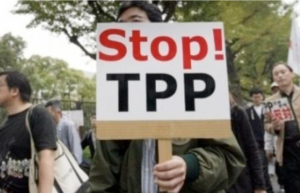U.S. trade policy after the TPP
Faith communities joined labor, environmental, development, and farm groups in celebrating the demise in the United States of the proposed Trans-Pacific Partnership trade agreement.
Faith communities joined labor, environmental, development, and farm groups in celebrating the demise in the United States of the proposed Trans-Pacific Partnership trade agreement. The following article was published in the January-February 2017 issue of NewsNotes.
On November 10, Senator Charles Schumer, now the Senate minority leader, told U.S. labor union leaders that the proposed Trans Pacific Partnership trade agreement will not be ratified by Congress.
The Maryknoll Office for Global Concerns and dozens of other faith, labor, environmental, development, and farm groups celebrated the end of a long campaign against this trade deal that was written to put the rights of investors before the needs of vulnerable people. The TPP did not safeguard access to affordable medicines or care for dignified livelihoods and traditional farming practices.
The agreement was negotiated for eight years and signed in February 2016 with 12 nations in Asia, Oceana and the Americas, including the United States. Faith communities raised concerns throughout the negotiations that the TPP would raise prices and limit access to generic medicines for people both in developing countries and in the United States.
Faith communities were equally concerned that the TPP lacked enforceability of sound environmental and labor provisions. Conversely, corporations would have the power to sue governments when their investments were limited by regulations or denied permit or other measures meant to protect national interests such as the environment, labor, or health. Such suits are brought before a three-judge panel of corporate lawyers in an extra-judicial court system like the one housed in the World Bank in Washington, D.C.
The TPP negotiations began in 2008 under the Bush Administration. Negotiations were put on hold in 2009 while the Obama Administration evaluated the agreement and began negotiations again at the end of the year.
The TPP faced growing opposition by both parties in 2016 and became an issue discussed during the primary and general presidential elections, even after the agreement was signed. Opposition was sustained over years by the powerful organizing and advocacy efforts of many coalitions and grassroots activists – including Maryknoll supporters who responded to action alerts and made calls and sent emails to members of Congress, President Obama and the U.S. trade representative.
In April 2016, people of faith came to Washington, D.C. from across the country to lobby their members of Congress to oppose the TPP because of the impacts on vulnerable people, creation, and democracy. Thank you to everyone who joined the “Stop the TPP” campaign.
Even with the TPP off the table, trade policy will continue to be an important issue with the Trump administration. President-elect Trump said he will seek better trade deals to benefit the United States. Within the first 100 days, his administration may try to renegotiate the North America Free Trade Agreement, a trade deal that has been in force for more than twenty years. It is possible that there could be some tweaks that improve labor conditions in Mexico. But trade provisions to improve labor conditions in other countries have largely been unenforced or difficult for concerned parties to actually get the U.S. to file official complaints.
NAFTA renegotiations could also lead to worse provisions for Mexico and Canada, including wait times for generic medicines. But if negotiations do open up, Canada and Mexico will also have their own demands. If the U.S. does not accept these demands, Mexico and Canada may not be willing to renegotiate the deal.
It is also possible that the Trump Administration will negotiate bilateral agreements with countries like Japan. The U.S. is so far continuing to negotiate the Trade in Services Agreement, which will liberalize services ranging from car sharing programs like Uber to energy providers. This would open up more markets related to trade disputes when companies feel they are treated unfairly by a nation.
So while groups celebrate the demise of TPP, there will still be much work ahead for trade justice advocates. “We welcome dialogue,” said Chloe Shwabe of the Maryknoll Office for Global Concerns, “between governments, businesses, civil society, and affected communities to develop more transparent and equitable trade agreements that center on respect for God’s creation and the human family, and the promotion of sustainable livelihoods through small-scale, local development initiatives.”
In preparation, some groups are beginning to put forward alternative trade models. One interesting climate-friendly approach to trade is offered by the Sierra Club (http://bit.ly/SierraClubTrade).

